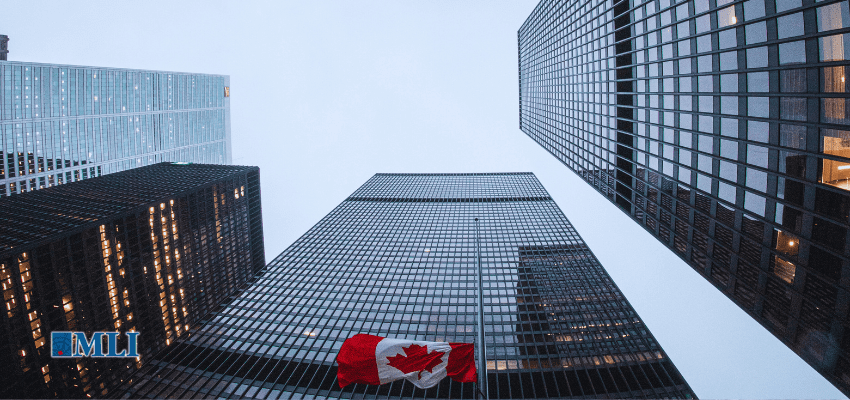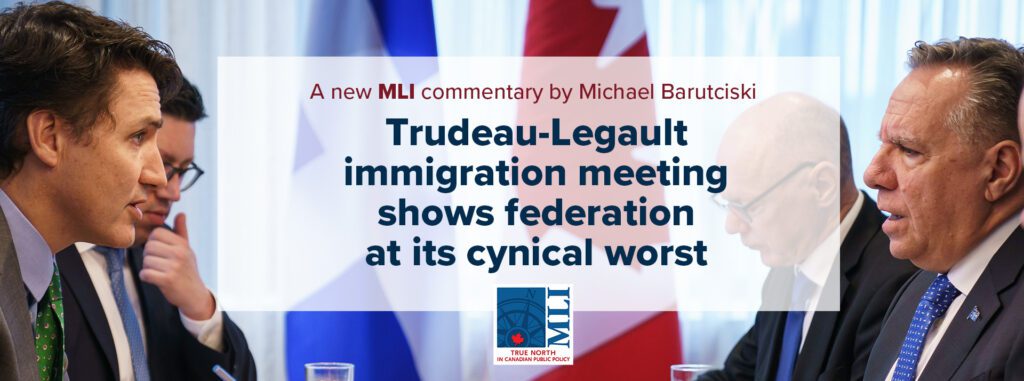This article originally appeared in the Hub.
By Chris Alexander, November 25, 2024
Canada’s next government will be inheriting an immigration mess—probably the worst since the early 1980s, when asylum claims spiked, labour markets shifted, birth rates fell, business investment stumbled, and another Trudeau was leaving office.
Back then the solution was major reforms. These included a new refugee determination system and revamped economic immigration programmes.
Today we need sound oversight of our existing system by ministers and a cabinet that cares about restoring competence, integrity, and success as its cornerstones.
They need to tackle an overarching issue—the only firm foundation for immigration—by restoring the promise of our economy.
The world’s top professionals, tradespeople, entrepreneurs, and those aspiring to such careers won’t choose Canada if growth here is stagnating.
In 2014, our nominal per capita GDP was roughly equal to the U.S. Today real GDP per capita in the U.S. is 50 percent higher than here, restarting the brain drain we lamented in the 1970s.
Those quitting Canada now include recent economic immigrants: a recent study by the Institute for Canadian Citizenship for the Conference Board of Canada found our retention rate declined sharply in 2017 and 2019. COVID likely brought it down further. Why target high levels of immigration, when prospects for our economy have darkened?
We haven’t only lost ground to the U.S.: Germany, the Netherlands, Belgium, the Nordic countries, Australia, and Singapore have gotten richer for a decade, while Canada has faltered.
In other words, our brain drain and immigration disarray are symptoms of a deeper economic malaise, just as they were in the 1980s. Then as now, Canada’s economy needed to boost investment, productivity, innovation, and competition.
From 2014 to 2022, Canadian GDP per person grew by only 0.6 percent per year, the third lowest rate among thirty OECD countries and ahead of only Luxembourg and Mexico.
Over the same period, total business investment in Canada (excluding residential construction) sagged by 7 percent; in extractive industries—oil and gas, mining, and quarrying—it fell by a whopping 51 percent. In other words, we have a larger workforce for an under-capitalized business sector, leaving wages stagnant and housing often out of reach.
Why do investors now shun Canada? Corporate tax rates became less competitive, especially compared to the U.S. We added a carbon tax, while the U.S. did not. Natural resource projects hit regulatory thickets. Now we are taxing capital gains—the risk-takers’ incentives.
To entice investors back, we need not mirror the U.S. Our tax and regulatory frameworks should work for us and impress great companies. Investment is pouring into well-governed Nordic economies. Italy has seen manufacturing bounce back. India, Korea, Japan, Singapore, and Taiwan are innovating to grow. Why not restore the Canadian advantage we lost after 2015 by ensuring the best firms in advanced manufacturing, energy, agri-food, mining, professional services, finance, and technology set up here?
When I took over immigration in 2013, Canada’s GDP per capita was US$52,600: I dreamed of ground-breaking measures that would drive it to US$100,000.
Instead, 10 years later nominal GDP per capita in Canada is US$53,000 and most Canadians have no idea why our incomes flat-lined.
Everyone wants to turn the page on these doldrums: fixing our economy is job one. But to get immigration back on track, a new Conservative government needs to do six more things.
First, set immigration levels between 300,000 and 400,000—targeting the lower end so long as our economy struggles and apportioning economic immigrants roughly equally among Skilled Worker, Canadian Experience, and Provincial Nominee programmes. In future, immigration levels should be driven by our prospects for economic growth and the availability of basic services like health care and housing. But there is no substitute for decent, clear-eyed political judgement on these issues.
Second, end access for low-skilled temporary foreign workers, a subsidy for uncompetitive businesses and, as the prime minister recently put it, “big chain corporations.” Skilled workers may still be needed in selected fields, but the system needs to be tight and well-managed, not a morass of abuse and ad-hockery.
Third, process 260,000 asylum claims fast. The law requires hearings within 60 days; currently, they take over three years. The Immigration and Refugee Board needs to staff up and burn the midnight oil to take this backlog back below 10,000, where it was in 2015. To prevent new backlogs, our visa requirements should be de-politicized: citizens of countries that do not meet our existing criteria for lifting visa requirements should be required to have them. Our current government undermined these criteria, notably in the case of Mexico, with predictable consequences.
We also need to come to grips with the number of people now in Canada without any immigration status, which has ballooned, and ensure such cases are resolved via existing programmes, including the humanitarian and compassionate stream, or through the asylum system. People should not be left in limbo or the shadows.
Fourth, lift current caps for international students so our best institutions of higher education are not punished for our current government’s missteps and implement a hard-edged strategy to end fraud and “fake colleges” and restore Canada’s merit-based reputation.
Fifth, a new government should think creatively about the world’s refugee crises. By April 2024, about 120 million persons were forcibly displaced worldwide—nearly twice the 2014 figure. About 43 million are refugees. Our generous refugee programmes failed to reverse these horrendous trends. Why? Because the dictators responsible for wars, genocides and repression in the Sahel, Middle East, South Asia, and Ukraine have gone unpunished.
Russia alone launched migration crises in Europe, Turkey, and Africa; genocide in Syria and Ukraine; coups and repression on four continents; and Europe’s largest postwar invasion. Iran armed terrorists. Pakistan put the Taliban back in power. China and North Korea help them.
These aggressors are behind this spike in displacement. To prevent the number of refugees from doubling again, Canada should commit to Ukraine’s victory, sanction Iran and Pakistan, and focus our refugee programmes on victims we failed over the past decade.
Sixth, we need to restore our sense of unity and trust. The Chrétien government had a cabinet committee on social union; we need something similar now. Canada should be free of violent extremism, hate speech and antisemitism. Our borders should be respected and our laws enforced. New citizens should be equipped to resist disinformation and polarization.
Far from being “post-national,” Canada’s strong, dynamic culture and identity attract millions who want to work hard, support families, communities, and businesses, live under the rule of law, participate in good government, and help those less fortunate than themselves.
By fixing the economy and taking six additional steps, we can turn a corner on immigration. Asylum backlogs, abuses by “big chain corporations” and “fake colleges” did not spring out of the ether. They are by-products of too many years of poor administration. With competent management, Canada’s economic promise can be restored and our immigration programmes will see better days.







